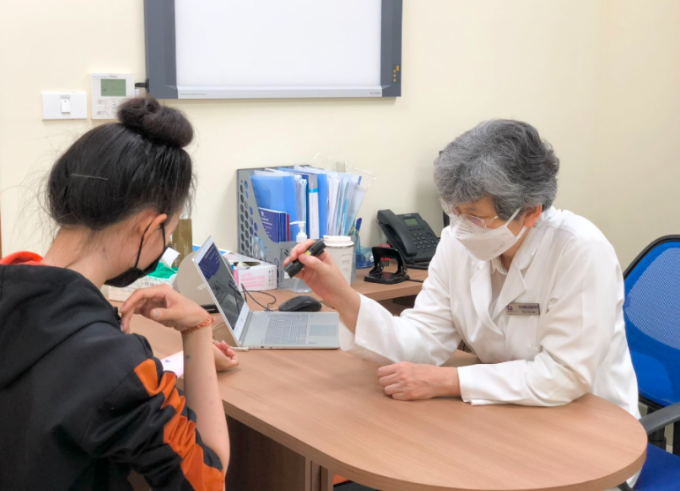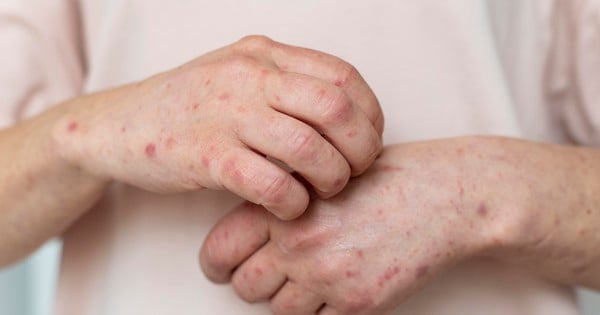Skin lesions have many causes, are usually benign and can heal on their own, but there are many chronic lesions that are difficult to treat.
Dr. Dang Thi Ngoc Bich, a specialist in Dermatology - Cosmetic Dermatology, Tam Anh General Hospital, Ho Chi Minh City, said that skin lesions can be the result of trauma, sunburn, contact dermatitis or a manifestation of infection, autoimmune disease, or genetics. Although most skin lesions are benign and harmless, some cases can develop into skin cancer. Below are common causes of skin lesions.
Indigo
Eczema is a very common skin condition that can affect people of all ages. It is usually painless but causes itching, redness, dryness and irritation. Some types of eczema, such as contact dermatitis, cause a burning and uncomfortable feeling.

Dr. Dang Thi Ngoc Bich is examining skin lesions on a patient. Photo: Provided by the hospital
Psoriasis
Psoriasis is a disorder that causes keratinocytes to become irritated and multiply 10 times faster than normal. Psoriasis can appear anywhere on the body, commonly on the elbows, knees, face, inside the mouth, scalp, palms, feet...
Skin cancer
Skin cancer involves the abnormal growth of cells within the skin tissue. It can spread to other tissues or areas of the body if not detected early. The main cause of skin cancer is overexposure to sunlight.
Herpes simplex
Herpes simplex virus (HSV) is a virus that loves the skin and nerves, causing recurrent infections, affecting the skin, mouth, lips, eyes and genitals. In addition, the disease also causes serious infectious complications: encephalitis, meningitis, and neonatal herpes.
Dyshidrosis
Dyshidrotic eczema (or dyshidrotic eczema) is a common type of eczema that affects adolescents and adults. It causes small, fluid-filled blisters to appear on the fingers, toes, palms, and soles of the feet.
Scabies
Scabies is caused by the parasite Sarcoptes scabiei, which causes intense itching. The disease spreads rapidly through close contact between people.
Atopic dermatitis
Atopic dermatitis is a condition of dry, itchy, inflamed skin that occurs at all ages but is common in young children and is related to genetic factors (genes).
Sunlight
Sunlight helps the body synthesize and produce vitamin D. However, too much exposure to sunlight can cause skin damage. Common damages include: sunburn, skin aging, actinic keratosis, skin cancer, and even aggravate skin diseases.
Unhealthy diet
An unhealthy diet can affect the maintenance of healthy skin. Consuming too much fat, refined sugar, and processed foods can negatively affect the skin.
Cosmetic chemicals
Skin damage due to contact with chemicals and cosmetics is a condition where the body is allergic to the ingredients used to make cosmetics, especially fragrances (fragrance-creating substances). Common symptoms: burning, redness, itching, discomfort.
Dr. Dang Thi Ngoc Bich shared that skin damage is caused by many reasons. When skin damage appears, patients should see a Dermatologist - Dermatologist to check the benign or malignant condition, thereby treating it early, avoiding unwanted complications.
In addition, patients should also note not to use unverified solutions or treatments using folk methods, as they can cause infections. Do not use drugs on your own, especially antibiotics or steroid anti-inflammatory drugs. You should have a healthy diet and lifestyle: limit alcohol and stimulants, increase green vegetables and fruits, exercise... Take care of skin lesions as directed by your doctor.
Nguyen Van
Source link









































![[Photo] Prime Minister Pham Minh Chinh chairs Government Conference with localities on economic growth](https://vstatic.vietnam.vn/vietnam/resource/IMAGE/2025/2/21/f34583484f2643a2a2b72168a0d64baa)

























































Comment (0)